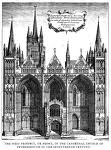
[This is taken from Augustine Calmet's Phantom World, originally published in 1850.]
Ricaut, in the history he has given us of the present state of the Greek church, acknowledges that this opinion, that the bodies of excommunicated persons do not decay, is general, not only among the Greeks of the present day, but also among the Turks. He relates a fact which he heard from a Candiote caloyer, who had affirmed the thing to him on oath; his name was Sophronius, and he was well known and highly respected at Smyrna. A man who died in the Isle of Milo, had been excommunicated for some fault which he had committed in the Morea, and he was interred without any funeral ceremony in a spot apart, and not in consecrated ground. His relations and friends were deeply moved to see him in this plight; and the inhabitants of the isle were every night alarmed by baneful apparitions, which they attributed to this unfortunate man.
They opened his grave, and found his body quite entire, with the veins swollen with blood. After having deliberated upon it, the caloyers were of opinion that they should dismember the body, hack it to pieces, and boil it in wine; for it is thus they treat the bodies of revenans.
But the relations of the dead man, by dint of entreaties, succeeded in deferring this execution, and in the mean time sent in all haste to Constantinople, to obtain the absolution of the young man from the patriarch. Meanwhile, the body was placed in the church, and every day prayers were offered up for the repose of his soul. One day when the caloyer Sophronius, above mentioned, was performing divine service, all on a sudden a great noise was heard in the coffin; they opened it, and found his body decayed as if he had been dead seven years. They observed the moment when the noise was heard, and it was found to be precisely at that hour that his absolution had been signed by the patriarch.
M. le Chevalier Ricaut, from whom we have this narrative, was neither a Greek, nor a Roman Catholic, but a staunch Anglican; he remarks on this occasion that the Greeks believe that an evil spirit enters the bodies of the excommunicated, and preserves them from putrefaction, by animating them, and causing them to act, nearly as the soul animates and inspires the body.
They imagine, moreover, that these corpses eat during the night, walk about, digest what they have eaten, and really nourish themselves—that some have been found who were of a rosy hue, and had their veins still fully replete with the quantity of blood; and although they had been dead forty days, have ejected, when opened, a stream of blood as bubbling and fresh as that of a young man of sanguine temperament would be; and this belief so generally prevails that every one relates facts circumstantially concerning it.
Father Theophilus Reynard, who has written a particular treatise on this subject, maintains that this return of the dead is an indubitable fact, and that there are very certain proofs and experience of the same; but that to pretend that those ghosts who come to disturb the living are always those of excommunicated persons, and that it is a privilege of the schismatic Greek church to preserve from decay those who incurred excommunication, and have died under censure of their church, is an untenable assumption; since it is certain that the bodies of the excommunicated decay like others, and there are some which have died in communion with the church, whether the Greek or the Latin, who remain uncorrupted. Such are found even among the Pagans, and amongst animals, of which the dead bodies are sometimes found in an uncorrupted state, both in the ground, and in the ruins of old buildings.
Copyright © D. J. McAdam· All Rights Reserved